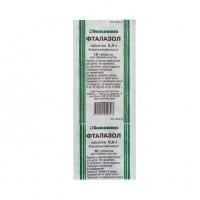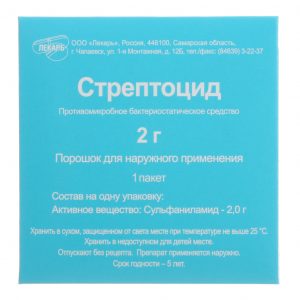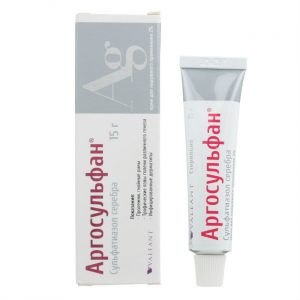Description
Release form
Tablets.
Packing
10 pcs.
Pharmacological action
Phthalazole – an antimicrobial agent from the group of sulfonamides. It has a wide range of actions, including pathogens of intestinal infections. It acts mainly in the intestinal lumen. The mechanism of action is associated with competitive antagonism with PABA and competitive inhibition of dihydropteroate synthetase, disrupts the formation of tetrahydrofoleic acid, necessary for the synthesis of purines and pyrimidines.
Indications
Dysentery, colitis, gastroenteritis, bowel surgery (to prevent purulent complications).
Contraindications
Increased individual sensitivity to diffuse systemic drugs, sulfa toxic acute hepatitis intestinal obstruction
Dosage and administration
Inside, in case of acute dysentery, adults in 1-2 days – 1 g 6 times a day, in 3-4 days – 1 g 4 times a day, in 5-6 days – 1 g 3 times a day. The average course dose is 25-30 g. After 5-6 days, the second course of treatment is carried out: 1-2 days – 1 g 5 times a day (in the afternoon – every 4 hours, at night – after 8 hours), 3-4 days – 1 g 4 times a day (do not give at night), 5 day – 1 g 3 times a day. The total dose in the second cycle is 21 g, with mild course – 18 g.
Highest doses for adults: single – 2 g, daily – 7 g.
Children under 3 years old – 0.2 g / kg in 3 divided doses for 7 days, older than 3 years – 0.4-0.75 g 4 times a day.
For other infections, adults are prescribed 1-2 g every 4-6 hours in the first 2 ² 3 days, half doses for children in the next 2 ² 3 days ² 0.1 g / kg / day in equal doses after 4 hours with a night break, the following days – 0.2-0.5 g every 6-8 hours.
Treatment with phthalazole, if necessary, is combined with the appointment of antibiotics. It is also advisable to prescribe along with phthalazole the well-absorbable sulfanides
Side effects
Allergic reactions (rash, fever), deficiency of B vitamins (due to inhibition of intestinal microflora), agranulocytosis, aplasmild anemia.
Drug Interactions
The following interactions may be observed with phthalazole in combination with other drugs.
PASK and barbiturates: increased activity of sulfonamides.
Thioacetasone, chloramphenicol: the possibility of developing agranulocytosis increases.
Nitrofurans: increased risk of anemia and methemoglobinemia.
Indirect anticoagulants: the anticoagulant effect is enhanced.
Oxacillin: decreased antibiotic activity.
The combined use of phthalazole with acids and acid-reactive drugs, hexamethylenetetramine, an adrenaline solution is impractical, because they are chemically incompatible.
With the combined use of phthalazole with preparations containing PABA esters (novocaine, anestezin, dicaine), the antibacterial activity of sulfanilamide is inactivated by a competitive mechanism. The effect is enhanced by antibiotics and well-absorbed sulfonamides.
Storage conditions
In a dry, dark place, at temperatures up to 25 ° C.
active substance
ftalilsulfatiazol
The dosage form of
tablet
Prescribing
For the appointments of the doctor, For adults s1430frd8frd8frd8frd7fdf730frd7 as prescribed by the doctor, Adults as prescribed by the doctor
Indications
of the cars from otravleniya, From kishechn h infektsiy, From Ñnterita
Irbitskij HFZ, Russia




